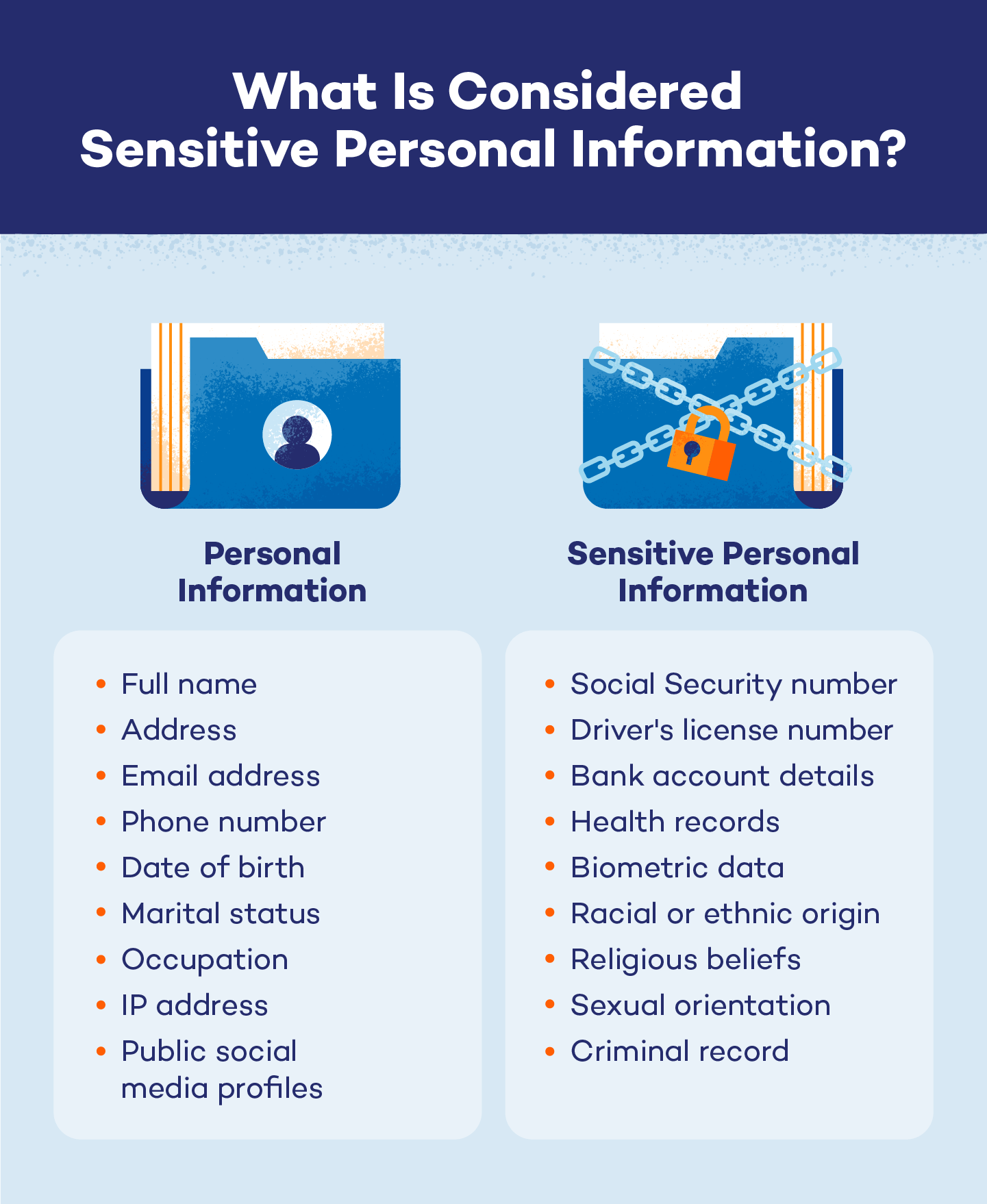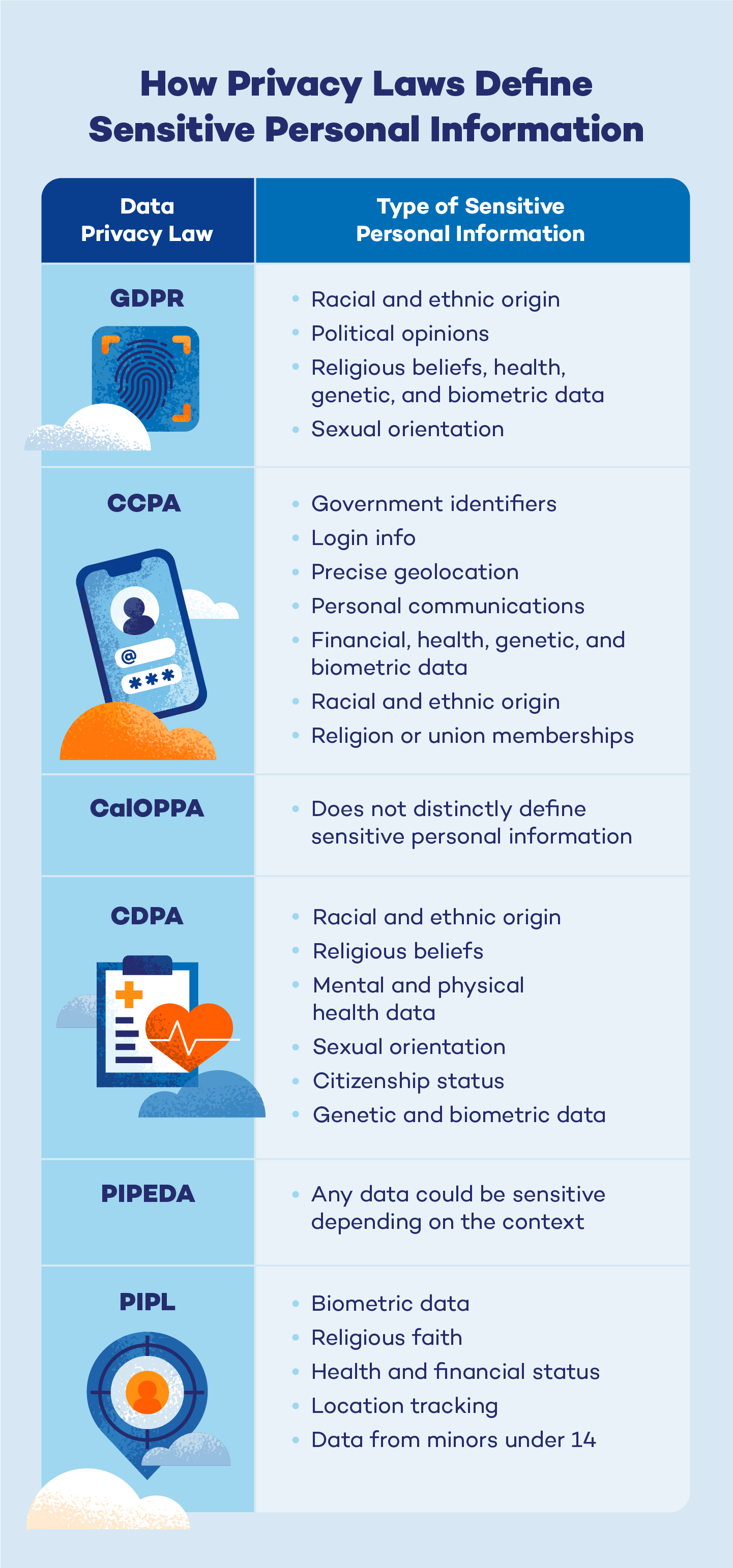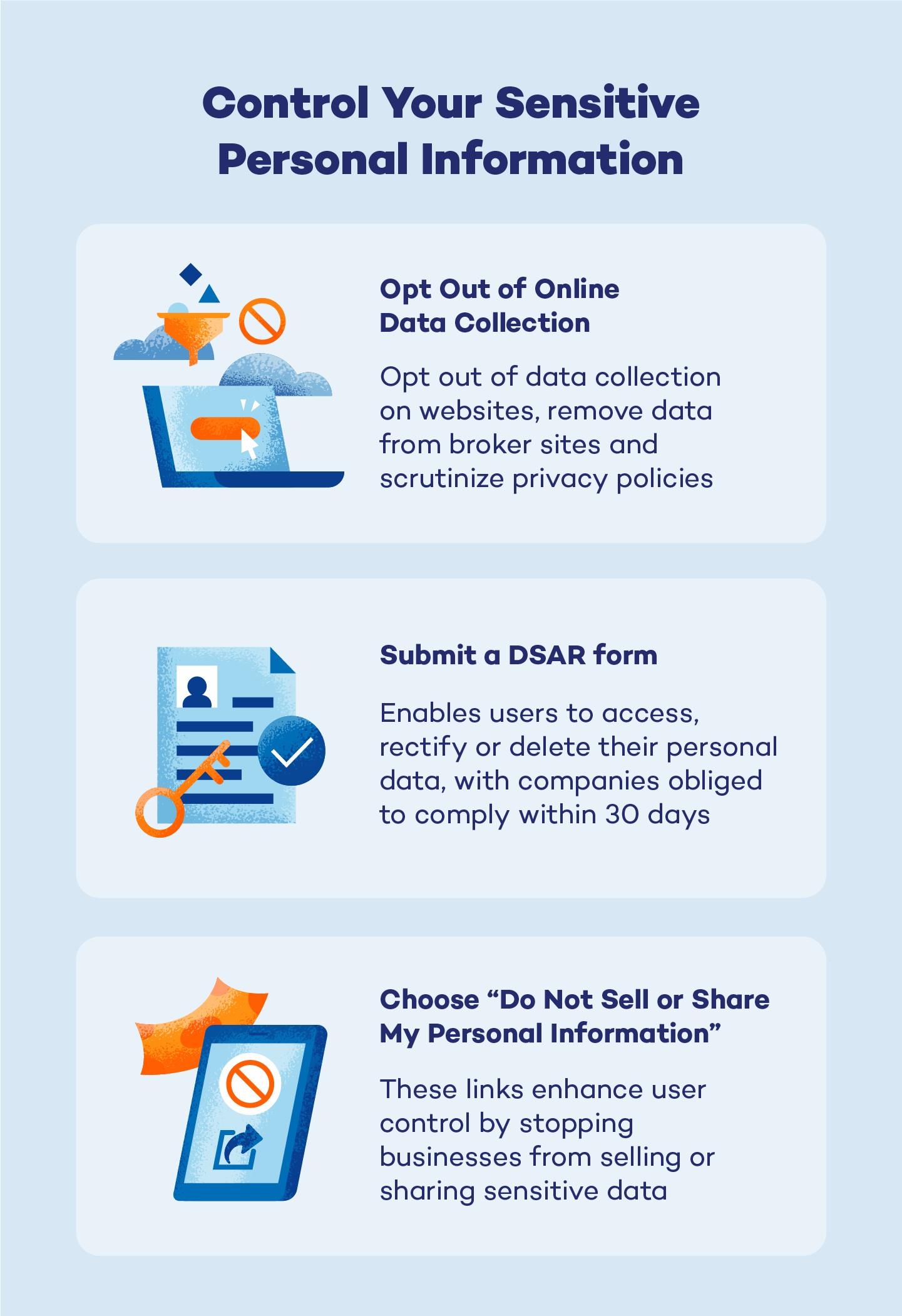In today’s world, where nearly everything is online, it’s all but guaranteed you will be affected by a data breach containing some of your sensitive personal information. IBM research indicates that between 2016 and 2018, more than 11.7 billion records and 11 terabytes of data were leaked or stolen in publicly reported incidents. To put that in perspective, 11 terabytes equals nearly a million phone books.
But what information is considered “sensitive” and how can you protect yourself from potential risks? The answers to these questions are not as complex as you might think.
Personal vs. Sensitive Personal Information: What’s the Difference?
Not all data is created equal. There’s a fine line between personal information and sensitive personal information, and understanding this distinction is crucial for both individuals and businesses.
- Personal information is any data used to identify an individual, like their name, address, email, photos, age or gender.
- Sensitive personal information (SPI) is a specific category of personal information that requires stricter protection due to the vulnerable nature of the data. Sensitive personal information includes a person’s race, ethnicity or cultural background, political opinions, religious or philosophical beliefs, trade union membership, genetic data, biometric data, health-related data, sexual orientation, criminal records and financial data.
By knowing these distinctions, you can better comprehend the nuances of data privacy laws and obligations to keep your information safe. Continue reading for a deeper exploration.
What Is Sensitive Personal Information?
Sensitive personal information is a particular category of personal information that is considered more critical and requires higher levels of protection. It includes details that, if exposed, could lead to serious consequences such as identity theft, cyberstalking or discrimination.
The range of what’s considered sensitive is broad and complex. However, if any of this information were to get into the wrong hands, it could have devastating impacts.

What Is Considered Sensitive Personal Information?
Sensitive personal information refers to data that reveals highly private or intimate details about an individual. Some examples include:
- Racial or ethnic origin: information about a person’s race, ethnicity or cultural background
- Political opinions: a person’s political affiliations, beliefs or opinions
- Religious or philosophical beliefs: information about an individual’s religious faith, spiritual beliefs or philosophical convictions
- Trade union membership: details about a person’s membership in labor unions or similar associations
- Genetic data: information related to an individual’s inherited or acquired genetic characteristics
- Biometric data: identifiable markers like fingerprints, facial recognition or other unique physical characteristics used for identification
- Health-related information: data about an individual’s physical or mental health, medical history or treatment records
- Sexual orientation: information related to a person’s sexual preferences or orientation
- Criminal record: details about a person’s criminal history, convictions or legal proceedings
- Financial information: sensitive financial data such as credit card numbers, bank account details or other financial status information
These categories of sensitive personal information are typically subject to stricter legal protections and require careful handling to prevent potential misuse or unauthorized disclosure.
What Is Not Considered Sensitive Personal Information?
While sensitive personal information requires heightened security measures, not all personal data falls into this category. Understanding what is not considered sensitive personal information helps differentiate between the data that requires extra protection and the information that, while still needing to be handled responsibly, doesn’t carry the same level of risk if exposed. Recognizing the difference can help you apply the appropriate level of care and protection and maintain a responsible approach to data privacy.
These are pieces of information that, while personal, are not classified as sensitive. They include:
- Name: your full name or initials
- Address: your residential or mailing address
- Contact information: phone numbers and email addresses
- Date of birth: although personal, it’s not considered sensitive
- Gender: male, female or other gender identities
- Business-related information: your job title or contact details related to your professional life
- Purchase history: records of what you have bought online or in stores
- Browsing history:: The websites you have visited (unless combined with other specific information that may reveal sensitive details)
- IP address: while unique to your device, it’s generally not considered sensitive
Both individuals and organizations should recognize this distinction. For individuals, it helps to know what rights and controls you have over your information. For organizations, it guides how different types of data should be handled, stored and shared, ensuring compliance with various privacy laws and regulations.
How Privacy Laws Address and Define Sensitive Information
The definition of sensitive information varies from law to law. Here are a few different definitions:
- General Data Protection Regulation (GDPR): deems sensitive information as data revealing political opinions, religious beliefs or data about a person’s sex life or sexual orientation
- California Consumer Protection Act (CCPA): defines sensitive information as certain government identifiers, login information, financial data, precise geolocation, personal communications, genetic data, biometric information, health, sex life or sexual orientation, racial or ethnic origin, religious or philosophical beliefs or union memberships
- California Online Privacy Protection Act (CalOPPA): does not distinguish sensitive information but describes personally identifiable information broadly
- Virginia Consumer Data Protection Act (VCDPA): information that includes data about racial or ethnic origin, religious beliefs, mental or physical health diagnoses, sexual orientation, citizenship or immigration status, genetic or biometric data and data from known children
- Personal Information Protection and Electronic Documents Act (PIPEDA): any data could be sensitive depending on the context; certain types of data, like health and financial data, are generally considered sensitive
- Personal Information Protection Law of the People’s Republic of China (PIPL): biometric identifiers, religious faith, particular identities, health and financial status, location tracking and data from minors under 14
While the definition of sensitive information varies, all laws indicate that organizations should only collect sensitive personal data if it’s essential to operations.

What Is Personal Information?
Personal information, often called personal data, is any information that can be used to identify a specific individual. It encompasses a wide range of data that could be linked to a particular person. Depending on the context, it can contain a wide range of data, such as names, addresses, phone numbers and more.
What Is Considered Personal Information?
The type and range of data classified as personal information can vary greatly, but generally includes the following:
- Names: full names, nicknames or any other identifiers that can be used to recognize a person
- Contact information: phone numbers, email addresses and residential addresses
- Identification numbers: Social Security numbers, driver’s license numbers, passport numbers or any other government-issued identification numbers
- Financial information: bank account details, credit card numbers and other financial data
- Online identifiers: IP addresses, cookies or other digital markers that can be traced back to an individual
- Biometric data: information like fingerprints, facial recognition or other biological attributes used for identification
- Health and medical information: medical history, health conditions, treatments and other related data
- Employment details: information related to a person’s job, salary, employer and work history
- Personal preferences and behavior: shopping habits, hobbies, interests and other information that reflects individual preferences or behavior
How to Control Your Sensitive Personal Information
These days, controlling your sensitive personal information is more crucial than ever. With the rise of data breaches and other cyberthreats, it’s essential to take proactive steps to safeguard this valuable data.
Opt Out of Collection on Websites or Browsers
One effective way to manage your sensitive personal information is by opting out of data collection on websites or browsers.
Start by doing an online search for your name. Many data broker websites like Radaris, Pipl, Spokeo and Whitepages will have your information listed. To remove your data from these platforms, visit the opt-out pages or send an email request.
The Privacy Rights Clearinghouse provides a comprehensive directory of such websites and their opt-out options. Scrutinize the privacy policies of your bank or other financial institutions since they often share data with brokers but typically allow you to opt out.
Submit a Data Subject Access Request (DSAR) Form
A data subject access request (DSAR) form can be instrumental in gaining control over your sensitive personal information. For instance, under the GDPR, an individual has the right to ask an organization whether or not it is processing their personal data.
In practice, a DSAR allows users to access the stored information about them and understand its usage. They can then demand the rectification of incorrect data or its deletion. Companies must comply with DSARs within one calendar month for GDPR and 45 days for CCPA, upholding your right to control your personal data.
Use “Do Not Sell or Share My Personal Information” Links
The California Privacy Rights Act (CPRA) has expanded the “Do Not Sell My Information” option from the previous CCPA to “Do Not Sell or Share My Information.”
This link, which must be visibly placed on a business’s homepage and Privacy Policy page, allows users to opt out of having their personal or sensitive personal information sold or shared with third parties.
When a user selects this option, businesses are legally obligated to stop the sale or sharing of that user’s sensitive data, enhancing users’ control over their sensitive personal information.

Sensitive Personal Information FAQ
Navigating the world of sensitive personal information can be perplexing, especially with the ever-changing landscape of data privacy laws. Let’s look at some frequently asked questions about sensitive personal information.
Why Is Protecting Sensitive Personal Information Important?
Protecting sensitive personal information is vital for several reasons, including safeguarding individual privacy, preventing identity theft and ensuring legal compliance.
Is an Email Address, Nationality or Name Considered Sensitive Personal Data?
An email address, nationality or name alone is considered personal data but not sensitive personal data. However, they may be categorized as sensitive when combined with other specific information.
How Do I Know if My Sensitive Personal Data Is Collected?
You can determine if your sensitive personal data is collected by staying vigilant about your online interactions and doing the following.
- Review privacy policies: Reputable organizations will disclose what data they collect, how they use it and with whom they share it in their privacy policies.
- Use privacy tools: Various privacy tools and settings can help you control and monitor the collection of your sensitive personal information.
- Exercise legal rights: Laws like GDPR allow EU residents to inquire about collecting and processing their personal data, enabling them to have control and awareness.
Navigating the complex landscape of sensitive personal information can be challenging, but understanding its importance and how to protect it is crucial in today’s digital world. Whether you’re an individual seeking to safeguard your privacy or a business aiming to comply with data protection laws, being informed is the first step.
More than 30 million daily users trust Panda Security to protect their sensitive personal information. Consider our premium protection services to help keep your digital data secure.





